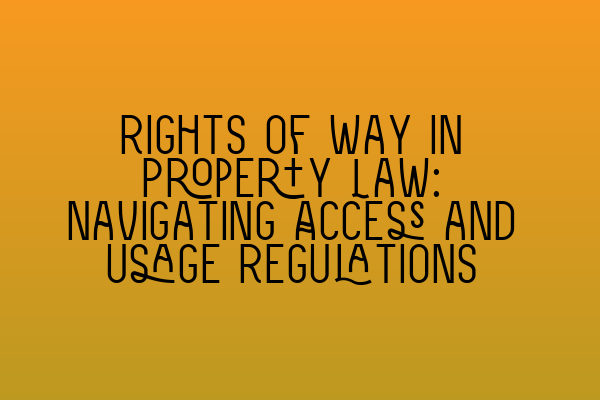Rights of Way in Property Law: Navigating Access and Usage Regulations
Welcome to SQE Property Law & Land Law! As solicitors specializing in property law, we understand the importance of access and usage regulations when it comes to rights of way. In this blog post, we will delve into the intricacies of rights of way in property law, helping you navigate through the complexities and gain a clearer understanding of this vital aspect of property ownership.
What Are Rights of Way?
In the context of property law, a right of way refers to the legal right to pass through someone else’s land or property. It grants individuals or entities the freedom to travel across a specific portion of land owned by another party, often to access their own land or property situated beyond it. Rights of way can be crucial in situations where direct access to one’s property is not feasible due to geographic or property boundary constraints.
Types of Rights of Way
Rights of way can be classified into two main categories: express rights of way and implied rights of way. Express rights of way are explicitly granted through a legally binding document, such as a deed or contract. These documents outline the specific terms and conditions governing the right of way, such as the extent of the right, its purpose, and any limitations or restrictions.
Implied rights of way, on the other hand, are not explicitly granted but are implied by law based on the circumstances of the situation. For example, if a property is sold and the only access to that property is across an adjoining piece of land, an implied right of way may be established to ensure the property remains accessible. It is important to note that implied rights of way may be subject to interpretation by the courts and can vary depending on the jurisdiction.
Establishing Rights of Way
To establish a right of way, it is crucial to ensure that the necessary legal requirements are met. Whether you are seeking to establish an express or implied right of way, it is advisable to consult with a qualified property law solicitor who can guide you through the process and ensure that all necessary steps are taken.
Express rights of way require a legally binding document, such as a deed, that clearly and precisely outlines the terms and conditions of the right of way. This document should be carefully drafted to avoid any ambiguity or confusion that may arise in the future.
Implied rights of way, on the other hand, are based on the circumstances and reasonable expectations of the parties involved. Factors such as historical usage, previous agreements, and the intentions of both parties will be considered by the courts when determining the existence and extent of an implied right of way.
Navigating Access and Usage Regulations
While rights of way grant individuals or entities the legal right to pass through another’s land, it is important to understand that these rights come with certain responsibilities and limitations. Access and usage regulations play a crucial role in determining how a right of way can be used and enjoyed.
Common access and usage regulations include restrictions on the type and size of vehicles that can utilize the right of way, the hours of usage, and any specific conditions or limitations set out in the granting document. It is important to comply with these regulations to avoid any legal disputes or claims that may arise from non-compliance.
Seeking Legal Guidance for Rights of Way
Given the complexities surrounding rights of way and the potential disputes that can arise, it is highly recommended to seek the guidance of a qualified property law solicitor when dealing with issues related to rights of way. A solicitor with expertise in property law can assist in navigating the various legal requirements and ensure that your rights are protected.
For further insights and guidance on the broader field of contract law, you may find the following articles helpful:
– [SQE Contract Law: Analyzing Landmark Cases and Influential Judicial Decisions](https://contract-law-sqe.co.uk/sqe-contract-law-analyzing-landmark-cases-and-influential-judicial-decisions/)
– [Understanding Contractual Capacity: Rights and Limitations](https://contract-law-sqe.co.uk/understanding-contractual-capacity-rights-and-limitations/)
– [Interactive SQE Mock Tests for Contract Law: Test Your Knowledge](https://contract-law-sqe.co.uk/interactive-sqe-mock-tests-for-contract-law-test-your-knowledge/)
– [Join Our SQE Contract Law Webinars: Expert Insights and Guidance](https://contract-law-sqe.co.uk/join-our-sqe-contract-law-webinars-expert-insights-and-guidance/)
– [SQE Prep: Mastering the Essentials of Contract Law](https://contract-law-sqe.co.uk/sqe-prep-mastering-the-essentials-of-contract-law/)
In conclusion, understanding rights of way in property law is essential for property owners and anyone involved in property transactions. If you require assistance or have any questions regarding rights of way or any other property law matters, do not hesitate to contact SQE Property Law & Land Law. Our team of experienced solicitors is dedicated to providing expert advice and guidance to help you navigate the complex landscape of property law.
